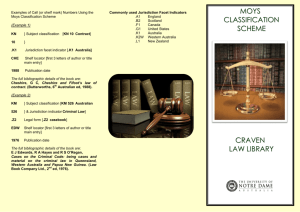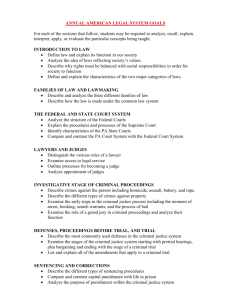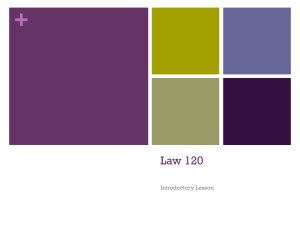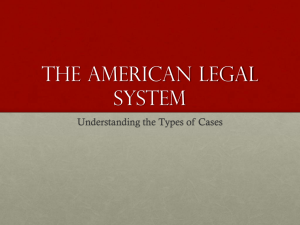criminal law - global dimension
advertisement
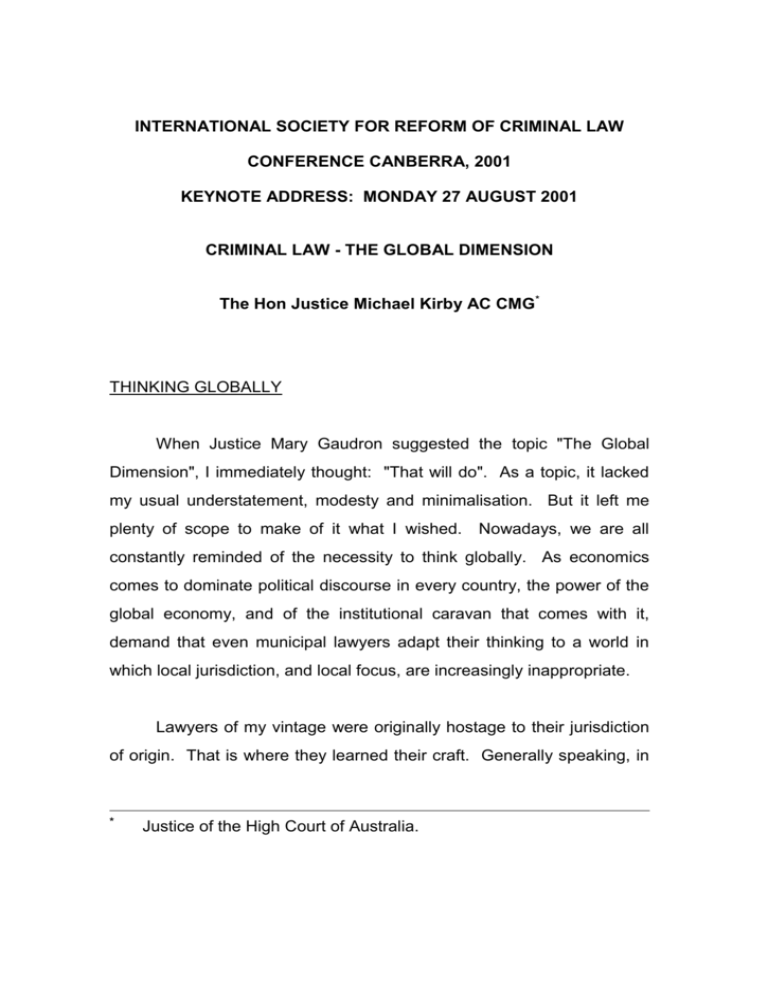
INTERNATIONAL SOCIETY FOR REFORM OF CRIMINAL LAW CONFERENCE CANBERRA, 2001 KEYNOTE ADDRESS: MONDAY 27 AUGUST 2001 CRIMINAL LAW - THE GLOBAL DIMENSION The Hon Justice Michael Kirby AC CMG* THINKING GLOBALLY When Justice Mary Gaudron suggested the topic "The Global Dimension", I immediately thought: "That will do". As a topic, it lacked my usual understatement, modesty and minimalisation. But it left me plenty of scope to make of it what I wished. Nowadays, we are all constantly reminded of the necessity to think globally. As economics comes to dominate political discourse in every country, the power of the global economy, and of the institutional caravan that comes with it, demand that even municipal lawyers adapt their thinking to a world in which local jurisdiction, and local focus, are increasingly inappropriate. Lawyers of my vintage were originally hostage to their jurisdiction of origin. That is where they learned their craft. Generally speaking, in * Justice of the High Court of Australia. 2. the old days, it was enough to know the statutes and judge-made law of your own jurisdiction. To some extent, Australian lawyers were rescued from the parochialism threatened by their geographic isolation, by reason of the institutional links to the Privy Council in London1. Those links lasted from colonial times until well into the twentieth century2. They necessitated the inclusion, in any law library worth looking at, of the series that reported the judicial decisions of England, then (as now) one of the great legal centres of the world. In this country, law libraries of practitioners commonly added only the reports of the High Court of Australia and of the Supreme Court of the State. Until quite recently, Australian lawyers paid relatively little attention to decisions outside their own State jurisdiction; and virtually none to decisions of the courts of other common law countries. As for the tribunals of the civil law tradition, such exotica was regarded as completely irrelevant to our legal needs. In no field of law was local jurisdiction more important than the criminal law. The aphorism, criminal law is local persisted in Australia even until very recent times3. In this country, like the United States but 1 F C Hutley, "The Legal Traditions of Australia as Contrasted to Those of the United States" (1986) 60 ALJR 148. 2 The links were successively severed by Privy Council (Limitation of Appeals) Act 1968 (Cth); Privy Council (Appeals from the High Court) Act 1975 (Cth); Australia Act 1986 (Cth), s 11; cf Kirmani v Captain Cook Cruises Pty Ltd [No 2]; Ex parte Attorney-General (Q) (1985) 159 CLR 461 at 464-465. 3 Morgan v White (1912) 15 CLR 256 at 306; The Queen v Foster; Ex parte Eastern and Australian Steamship Co Ltd (1959) 103 CLR 256 Footnote continues 3. unlike Canada, criminal law was not included, as such, in the list of subjects upon which the Federal Parliament could legislate. Any federal legislation imposing penal sanctions had to find its constitutional source in some other head of legislative power. This fact encouraged different approaches in different parts of this country not only to the content of criminal law but also to its expression. In four jurisdictions codification of the criminal law has been attempted 4. In other States and Territories there is a mixture of statutory provisions and surviving common law rules. Coinciding with the decline of the Privy Council's role, in lifting our sights to the great legal movements taking place elsewhere on the planet came technological advances that demanded that we think globally. These included broadcasting and telecommunications which, from the start, were vital for Australia to overcome the tyranny of distance. But they also included fast and efficient international travel. Such travel reminded us of our relationship with the rest of humanity. Whereas Europeans, North Americans and Chinese could live quite comfortably with the conviction that they were the centre of the universe, Australians (except in matters of sport) had no such illusions. at 306; The King v Oliphant [1905] 2 KB 61 at 72-73; Compania Naviera Vascongado v SS Christina [1938] AC 485 at 496-496. See now Lipohar v The Queen (1999) 74 ALJR 282. 4 Criminal Code 1899 (Q); Criminal Code 1913 (WA); Criminal Code 1924 (Tas); Criminal Code 1983 (NT). 4. Now, the Internet and cyberspace potentially bring to every lawyer's office instantaneous links with legal developments everywhere. And these technological changes have coincided with the rapid advance of the realisation that international law and international institutions have practical significance for the lives of practising lawyers and judges. Out of the ashes of the Second World War came the great movement of international human rights law and an impetus towards relevance of that law by reason of the three great scientific advances that demand legal responses: nuclear fission, informatics and biotechnology. Largely by chance, I have enjoyed opportunities over the past quarter century to serve in a number of international bodies involved in developing the legal responses to these phenomena. In the Organisation for Economic Cooperation and Development (OECD), I worked in the 1970s and 1980s on two Committees concerned with the policy implications of transborder data flows5. Arising out of that work, I learned of the special difficulties that the criminal law faces in effectively regulating, policing, prosecuting and punishing those engaged in deliberately wrongful acts across borders, where the victims may be in places far from the wrongful conduct6. Through UNESCO I have come 5 Organisation for Economic Cooperation and Development, Guidelines on the Protection of Privacy and Transborder Data Flows of Personal Data (1981). See Privacy Act 1986 (Cth), Schedule. 6 M D Kirby, "Legal Aspects of Transborder Data Flows", 11 Computer/Law Journal 283 at 240-243 (1991); cf The Queen v Gold [1988] 2 All ER 186 at 189. For the most recent developments see the proposed Council of Europe Convention on Cybercrime: W Footnote continues 5. lately to know some of the many legal problems presented to humanity by the miraculous advance of the Human Genome Project7. Attempts to regulate genomic science in a single jurisdiction, even one so powerful as the United States, will not succeed without substantial global cooperation. Before my appointment to the High Court of Australia, I served as Special Representative of the Secretary-General of the United Nations for Human Rights in Cambodia. Rebuilding the institutions of criminal law, virtually from scratch, was a necessity in that country because of the Khmer Rouge genocide after Year Zero8. Instructing the new "judges" of Cambodia, most of whom had no legal training, many of whom were teachers chosen because they were literate, was a mighty challenge. The stories I heard, and the sights I saw, in Cambodia caused me to press for the establishment of a tribunal that would bring to justice the most egregious perpetrators of the genocide. Only now is Cambodia moving towards a multi-member body with some international Madsen, "Internet Surveillance Receives International Support" (2001) I-Ways 20 at 22. 7 eg M D Kirby, "Intellectual Property and the Human Genome" (2001) 12 Australian Intellectual Property Journal 61. 8 D P Chandler, The Tragedy of Cambodian History (1991), 226ff; B Kiernan, The Pol Pot Regime (1996) 31; S Thion, Watching Cambodia (1993), 163. 6. judges, to render those responsible for crimes against humanity accountable for their acts9. In fact, the growth of such ad hoc tribunals is proliferating. They have been set up, or are planned, for the former Yugoslavia, Rwanda, Sierra Leone, Kosovo, East Timor, the Lockerbie Disaster and elsewhere. These are remarkable developments. They show just how far criminal law has come, in responding to the world of today. It has advanced from its old confinement to the jurisdiction of the place where the criminal acts occurred. The surrender of Slobodan Milosovic to the International Criminal Tribunal for the Former Yugoslavia marks a new chapter in the work of that body. If the trial of Mr Milisovic is accomplished with professionalism and adherence to impartiality, independence and due process, it will form a sound foundation for the proposed International Criminal Court10. From these observations, it will be obvious why I regard the global dimension as the natural starting point for an international conference on 9 An Expert Committee of the United Nations (chaired by Sir Ninian Stephen, past Justice of the High Court of Australia) recommended an International Tribunal. The Government of Cambodia has agreed to the establishment of a Cambodian tribunal to which international judges may be appointed. 10 R May et al (editors) Essays on ICTY Procedure and Evidence in Honour of Gabrielle Kirk McDonald (Vol 3 International Humanitarian Law Series 2001); cf Rome Statute of the International Criminal Court, 37 ILM 999 (1998) noted H J Steiner and P Alston, International Human Rights in Context - Law, Politics, Morals (2nd ed, 2000), 1192. 7. the criminal law, and particularly on reform of the criminal law. Time, and your patience, do not permit an examination of all the many developments that are occurring that merit consideration. But in my chosen context I want to mention three developments with which I have been partly associated. They are interesting and, in my view, important. In a sense, they are symbols of the new era that criminal law is entering. They are samples of what may be expected as this century unfolds. UNIVERSAL JURISDICTION The first, is universal jurisdiction. This issue has attracted attention in recent years in common law countries because of the saga of litigation in England concerning the former Chilean President, Augusto Pinochet11. In fact, Pinochet did not represent an assertion by the English courts of a claim to universal jurisdiction for the grave crimes against international law alleged to have been perpetrated in Chile by Pinochet or by others for whose acts he was responsible. Technically, the Pinochet cases, in England, were no more than a response to an application for the extradition of Senator Pinochet to Spain under the established law giving effect to an extradition treaty to which the United 11 R v Bow Street Metropolitan Stipendiary Magistrate and Ors; Ex parte Pinochet Ugarte [2000] 2 AC 61; [2000] 1 AC 119; [No 3] [2000] 1 AC 147. 8. Kingdom and Spain were both parties12. What was unusual about Pinochet was that the Spanish magistrate, whose orders founded the application for extradition, was responding to complaints in Spain by victims and survivors of crimes allegedly committed in Chile. Traditionalists might have questioned (as the Senator's lawyers most certainly did) the authority and jurisdiction of the Spanish courts to "intermeddle" in matters of criminal law that were the responsibility of the Chilean courts. But that consideration was not thought fatal to the ultimate decision of the majority of the Law Lords who upheld the validity of the extradition request13. In the end, by a decision of the Home Secretary, Senator Pinochet was not extradited to Spain but returned to Chile. However, an important signal was sent that the issue of universal jurisdiction had arrived for common law countries. For some time, this subject has been under the consideration of courts in several countries of the civil law tradition. In January 2001 I took part in a conference at Princeton University in the United States of America concerning universal jurisdiction. The participants included judges, academics, international civil servants and human rights lawyers from every continent. Cautiously, the participants 12 In the United Kingdom governed by the Extradition Act 1989 (UK), ss 2, 8(1). The case also involved the construction and application of the State Immunity Act 1978 (UK), s 20 read with Diplomatic Privileges Act 1964 (UK), Sched 1, art 39(2). 13 R v Bow Street Stipendiary Magistrate & Ors; Ex parte Pinochet Ugarte [No 3] [2000] 1 AC 147. 9. agreed on fourteen principles. The number was symbolic. Woodrow Wilson, one-time President of Princeton University and later President of the United States formulated the famous fourteen points that stated the Allied war aims for the First World War. Many of them, in particular the right of self-determination of peoples, became key planks in the ideology of the twentieth century. Now a new fourteen points from Princeton are placed before the world as a response to the perceived unacceptability of tolerating the unaccountability of tyrants and autocrats for serious crimes against international law. I will annex to my paper as annexure A the Princeton Principles on Universal Jurisdiction14. They deserve to become known and to be discussed. It is important to state that, whilst universal jurisdiction has occasionally been invoked and applied in countries of the civil law tradition15, the same is not true of the courts of the common law world. Rarely, as in dicta in the Supreme Court of Israel in the Eichmann Case16, universal jurisdiction has been mentioned as a basis for a court's authority over an accused for crimes committed elsewhere. However, normally judges of our legal tradition demand a legislative or 14 The Princeton Principles on Universal Jurisdiction, Princeton University, 2001, 28-35. 15 Important cases include those brought in Belgium under a 1993 statute against genocide and the prosecution of the former President Hissène Habré in Senegal. 16 Attorney-General of Israel v Eichmann (1962) 36 ILR 277. See J Treves, "Jurisdictional Aspects of the Eichmann Case" (1987) 47 Minnesota Law Review 557. 10. established common law foundation for the exercise of jurisdiction over a person whose criminal acts are alleged to have happened in another country. Occasionally, a judge expressing a minority opinion has supported the notion of universal jurisdiction17. Or a judge may expressly reserve the point, commenting upon it sympathetically18. Sometimes the issue is held over because the case can more easily be disposed of on other grounds19. But one day, soon, the issue will be presented directly to a judge in the common law world. The accused will be within that judge's power, in the sense of being physically present in the jurisdiction, perhaps in court. The accusations of serious crimes, such as war crimes, crimes against peace, crimes against humanity, genocide and torture will be made by victims or survivors in testimony that is at once heart-rending and reliable. The question will then be posed whether the international legal principles of universal jurisdiction, that can be traced to the early responses of the law of nations to piracy20 17 R v Bow Street Stipendiary Magistrate and Ors; Ex parte Pinochet Ugarte [No 3] (1999) 2 WLR 827 at 910 per Lord Millett. 18 Nulyarimma v Thompson (1999) 165 ALR 621 at 622 [160] per Merkel J. 19 Wadjularbinna Nulyarimma v Thompson (2000) 21 (15) Leg Rep SL 1a (HCA) per Gummow, Kirby and Hayne JJ (refusing special leave); cf Re Limbo (1989) 64 ALJR 241; Thorpe v The Commonwealth [No 3] (1997) 71 ALJR 767. 20 H J Steiner and P Alston, International Human Rights Law in Context - Law, Politics, Morals (2nd ed, 2000) 112. 11. and slavery21, extend in the absence of express legislation to the grave crimes mentioned which, morally speaking, should not go unanswered. At Princeton, one of the participants, Lord Browne-Wilkinson dissented from the Principles. He acknowledged a strong personal inclination in favour of universal jurisdiction over serious international crime. However, he felt that such jurisdiction should only be exercised by an international court or by courts of one state of jurisdiction over nationals of another state, with the prior consent of the latter state. He expressed doubts on the failure to recognise the elements of sovereign immunity which, in the past, have attached (at least during office) to heads of state and heads of government and equivalent high office holders. He went on22: "…States antipathetic to Western powers would be likely to seize both active and retired officials and military personnel of such Western powers and stage a show trial for alleged international crimes. Conversely, zealots in Western states might launch prosecutions against, for example, Islamic extremists for their terrorist activities. It is naïve to think that in such cases the national state of the accused would stand by and watch the trial proceed: resort to force would be more probable. In any event, the fear of such legal actions would inhibit the use of peacekeeping forces when it is otherwise desirable and also the free interchange of diplomatic personnel". 21 L Henkin, "International Law: Politics, Values and Functions" noted in H J Stein and P Alston, International Human Rights Law in Context - Law, Politics, Morals (2nd ed, 2000) 127 at 128. 22 The Princeton Principles, above n 14, p 49. 12. In the book that will be published as a commentary on the principles, I have written a chapter on "Universal Jurisdiction and Judicial Reluctance"23. I have sought to explain the hesitations that judges of the common law tradition, at least, feel when asked, without supporting legislation, to exercise universal jurisdiction. Those reasons include the respect that is traditionally accorded to the legitimacy of judges in the place having most connection with a crime to deal with the matter; the comity that governs the operations inter se of municipal legal systems; the belief that many judges would have that such a large new jurisdiction should be accorded by legislation democratically adopted rather than by judicial invention; the general disinclination of judges to invent new bases of criminal liability24; the special hesitation that attaches to applying criminal law retroactively; and the anxiety about disturbing settlements, amnesties and grants of immunity, sometimes carefully worked out, to permit a troubled country to move on from its past. Naturally, I offer no final solution to the issue addressed in the Princeton Principles. But they deserve consideration. Sooner or later the problem will come to a court near you. 23 It is expected that this book will be published in 2002. The editor will be Professor S Macedo of Princeton University. 24 cf Reg v Knuller (Publishing, Printing and Promotions) Ltd [1973] AC 435 (HL). 13. JUDICIAL CORRUPTION The second experience of the global dimension that I wish to describe concerns another project in which I have been involved. Recently the United Nations Global Programme Against Corruption, based in Vienna, and the Office of the High Commissioner for Human Rights, based in Geneva, have launched an initiative to tackle what is perceived as a growing problem of corruption in the judiciary in many lands. This project has been supported by Transparency International, a global non-governmental organisation that promotes effective responses to corruption. As a result of an initiative of these bodies, an international group of judges from common law countries has tackled the development of an International Code of Judicial Conduct that could be adopted as an international standard to promote judicial propriety, to provide transparent rules, to stimulate effective accountability and to uphold a common standard of conduct in all parts of the world. The members of the group include the Chief Justices or senior judges from Bangladesh, India, Nepal, Nigeria, South Africa, Sri Lanka, Tanzania and Uganda. Judge Christopher Weeramantry, until recently Vice-President of the International Court of Justice, is the chairman. I am rapporteur. The object of the exercise, once a draft has been agreed by the judicial participants who generally share the experience of the common law, is to take it to judges of the civil law tradition. Thus it will be 14. considered by judges in Russia and Eastern Europe as well as by judges in Latin America before the final code is recommended to the United Nations. This development of such global principles usually takes a decade or so. But the draft code draws upon the rules already in force in many countries. It draws upon, and elaborates, the basic principles included in the statements of universal human rights, most notably the International Covenant on Civil and Political Rights25. There, the entitlement, in a suit of law and in criminal cases, is to a judge who is competent, independent and impartial26. Unfortunately, in many lands these fundamental principles are not observed. Even when judicial officers themselves are not corrupted, experience has shown that court registries and officials may be. Without a "tip" a file may be lost and will never make its way to a hearing. Without a bribe, a favourable decision may not be assured. In Bangalore, India in February 2001, the foregoing group agreed on the core values that should be reflected in the global principles established to combat the insidious effect of corruption upon the judiciary. impartiality, Those principles are propriety, independence, integrity, equality, competence, diligence and accountability. Although the Bangalore draft has now been published27, because it is 25 The ICCPR entered into force 23 March 1976 in accordance with Art 49. 26 ICCPR Art 14.1. 27 (2001) 14 Commonwealth Judicial Journal, 37. 15. placed before the international legal community for commentary, criticism and improvement, I will annex it as annexure B to this paper. The tendency for lawmakers in developed countries to treat corruption of overseas officials (including judges) carried out by their nationals as an affront against domestic norms is reflected in the Convention on Combating Bribery of Foreign Public Officials in International Business Transactions, negotiated by the OECD28. Australia is a party to that Convention and it has enacted federal legislation to give it effect29. Many Australian judges and lawyers would support initiatives to express standards and to sanction breaches of them in developing countries. Yet the same people often resist the idea that codes of judicial conduct, or increased accountability of judges, are necessary in this country. Informed writers have expressed reasonable anxiety that such developments might increase the opportunities for unwarranted harassment of judges30. There is a legitimate concern about the need to protect judicial officers from meritless and damaging complaints 28 ATS 1999, No 21 (Paris, 17 December 1997): entered into force 15 February 1995. In force for Australia 17 December 1999. 29 Criminal Code Amendment (Theft, Fraud, Bribery and Related Offences) Act 2000 (Cth). 30 D Drummond, "Do Courts Need a Complaints Department?" (2001) 21 Australian Bar Review 11. See also by the same author "Towards a More Compliant Judiciary" (2001) 75 ALJ 304. 16. mechanisms. This need is recognised in the Bangalore draft. It provides that ordinarily, except in serious cases that may warrant removal of the judge from office, proceedings to implement the code of conduct should be conducted in camera31. Most countries now have enforceable codes of judicial conduct. In many countries these are supported by legislative sanctions32. It seems unlikely that a country such as Australia will be able forever to resist the introduction of such standards on the footing that they are unnecessary. If they are truly unnecessary, and implemented in a way respectful of the nature and incidents of the judicial office, they will cause few difficulties. If they are necessary, they should be in place. INTERNATIONAL HUMAN RIGHTS LAW The third and final illustration of the impact of globalisation on criminal law concerns the influence of international human rights law. In many countries, but not Australia, the basic norms of civil and political rights are reflected in the text of the national constitution. In some countries, legislation has been adopted to give municipal effect to statements of human rights found in international and regional 31 Bangalore Draft, Code of Judicial Conduct, para 7.4. See annexure B. 32 The provisions in Canada and the United States are described in Ebner v The Official Trustee (2000) 25 ALJR 277 at 308 [171]. 17. conventions on the subject to which the country is a party. Even the United Kingdom, from which Australia inherited a deep suspicion about such general statements of rights, has recently brought into force legislation expressed in general language33. That country has long been subject to the decisions of the European Court of Human Rights in Strasbourg. In Australia, we have no such constitutional charter. Nor is there a binding regional convention or court to which persons who allege a breach of fundamental human rights by Australia can appeal. However, Australia is a party to the International Covenant on Civil and Political Rights. It has ratified the First Optional Protocol to that Covenant. Persons discontented with Australian legal decisions, on grounds that they involve breach of the Covenant, may communicate their grievances to the United Nations Human Rights Committee. Immediately this facility became available, two homosexual men in Tasmania communicated their complaint to the United Nations Committee concerning the invasion of their rights, and breach of the Covenant, involved in the sodomy provisions of the Tasmanian Criminal Code. After the mid-1970s, the legislatures of every other Australian State and Territory had repealed such provisions. But not Tasmania. 33 Human Rights Act 1998 (UK). 18. The UN Human Rights Committee upheld the communication34. It found Australia in breach of its obligations under the Covenant. In consequence, federal legislation was introduced to remove the infraction of the nation's international obligations. That legislation, overriding the Tasmanian law, was enacted by a nearly unanimous Federal Parliament here in Canberra. Tasmania contested the validity of the federal law. The intrepid challenges brought their case to the High Court of Australia to obtain a definitive ruling35. The Court upheld the standing of the challengers although I did not participate in that decision. Thereupon, Tasmania altered course. The Criminal Code was amended. The sodomy provision was repealed. Sexual offences were expressed in a way that drew no distinction between homosexual and heterosexual acts. Now, nowhere in Australia does the criminal law punish consensual sexual conduct of adults in private. In this area, as in others, the law has been reformed. The overreach of the criminal law has retreated. 34 Toonen v Australia, UN Human Rights Committee, Communication No 488/1992; Views adopted 31 March 1994. See F F Martin et al (eds) International Human Rights Law and Practice (1997) 675. The decision follows earlier rulings by the European Court of Human Rights: Dudgeon v The United Kingdom (1982) 4 EHRR 149; Norris v Ireland (1988) 13 EHRR 186; Modinos v Cyprus (1993) 16 EHRR 485. 35 Croome v Tasmania (1998) 191 CLR 119 considering the Human Rights (Sexual Conduct) Act 1994 (Cth). 19. For many years, as in many countries still today, the antihomosexual criminal laws were generally not enforced. But they remained on the statute books to occasion harassment, oppression, corruption and alienation. For me, this was an aspect of the criminal law that was not wholly theoretical. As I discovered my own sexuality, I realised that I was targeted by criminal laws that were an instrument to oppress me and homosexual men generally. They were part of the armory of discrimination, belittlement and denigration. That period, now happily past in Australia, gave me an insight into the occasional excesses of the criminal law and its instrumentalities. Many lawyers do not have that insight to I share it with you. Of course, I was not alone in this respect. But I am almost alone in pointing it out and reminding fellow judges and lawyers of the need constantly to keep the ambit of criminal law under scrutiny. And to be very sure that, in every case of its deployment, we can fully justify the exercise of State power against the liberty, reputation and means of the individual. Please remember throughout this conference that reform of the criminal law - an object of this Society - does not always involve enhancement of power of officials and enlargement of offences. Sometimes it means reducing those powers and abolishing offences36 All criminal laws should be regularly assessed against the standards of international human rights law. Our procedures, laws of 36 cf M D Kirby, "Global economic crime - acting resolutely, thinking laterally" (2001) 33 Amicus Curiae 4 at 6. 20. evidence and court practices need constantly to be measured against these criteria. In most countries, the judges must do this by reference to the principles stated in their domestic constitutions. In Australia, there are few such principles that are relevant. However, as the Tasmanian instance showed, sometimes international human rights treaties can stimulate the process of reform. Beyond the stimulus that such treaties provide to the lawmakers in Parliament, the principles that they encapsulate should also guide the judges where the national Constitution is unclear37, a statute is ambiguous38 or where the common law yields no clear and applicable precedent39. From a discipline that even a decade or so ago was viewed, almost exclusively, from within its own territorial paradigm, criminal law is now opening up to the global forces that are felt everywhere. Crime crosses borders and so must the law and its enforcement. Fundamental principles of human rights do not stop at the frontier. everywhere. They apply This is therefore an exciting time for the discipline of criminal law. It is a time for resolute action and equally resolute reform. It is therefore a time of great opportunity for the International Society for 37 Kartinyeri v The Commonwealth (1998) 195 CLR 337 at 417-422; cf Cabal v United Mexican States [2001] HCA 43 [9], fn 12. 38 cf Piper v Corrective Services Commission of New South Wales (1986) 6 NSWLR 352 at 361. 39 Mabo v Queensland [No 2] (1992) 175 CLR 1 at 42, where Brennan J invoked international norms against racial discrimination in his reasons for upholding recognition by the common law of Australia of indigenous claims to native title to land. 21. the Reform of Criminal Law. Australians are fortunate that you have chosen us for this most timely conference. Annexure A: The Princeton Principles: These are published by the Progam in Law and Public Affairs of Princeton University as The Princeton Principles on Universal Jurisdiction (2001). Annexure B: The Bangalore Code of Judicial Conduct (Draft) is published in (2001) Commonwealth Lawyer, 37. INTERNATIONAL SOCIEY FOR REFORM OF CRIMINAL LAW CONFERENCE CANBERRA, 2001 KEYNOTE ADDRESS: MONDAY 27 AUGUST 2001 CRIMINAL LAW - THE GLOBAL DIMENSION The Hon Justice Michael Kirby AC CMG

